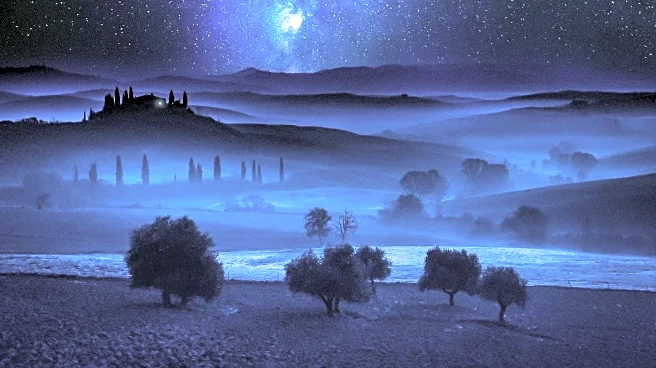What's Happening?
The Orionid meteor shower, an annual astronomical event, is peaking this week, offering a spectacular view of meteors in the night sky. Originating from debris left by Halley's Comet, the Orionids are known for their speed, traveling at 41 miles per second.
The shower will be most visible during the nights of October 20-23, with up to 20 meteors per hour expected. The new moon provides optimal viewing conditions, allowing for clearer skies. Texans are advised to find dark areas away from city lights for the best experience.
Why It's Important?
The Orionid meteor shower provides an opportunity for public engagement with astronomy, fostering interest in celestial events and science. It serves as a reminder of the vastness of space and the ongoing journey of Halley's Comet, which will next be visible from Earth in 2061. Events like this can inspire educational initiatives and community gatherings, promoting scientific literacy and appreciation for natural phenomena. The meteor shower also highlights the importance of preserving dark skies, which are increasingly threatened by urban light pollution.
What's Next?
As the Orionid meteor shower continues through November 7, enthusiasts and astronomers will monitor its activity, potentially contributing to research on meteor behavior and comet debris. Public interest may lead to increased participation in astronomy clubs and educational programs. The event could also spark discussions on environmental policies aimed at reducing light pollution, emphasizing the need for sustainable practices to protect natural nightscapes. Future celestial events may further engage communities in scientific exploration and environmental conservation.
Beyond the Headlines
The Orionid meteor shower underscores the interconnectedness of celestial bodies and Earth's position in the solar system. It invites reflection on humanity's relationship with the cosmos and the historical significance of comets in scientific discovery. The event also poses ethical considerations regarding the impact of human activity on natural environments, prompting discussions on balancing technological advancement with ecological preservation. As interest in space exploration grows, the meteor shower may inspire broader conversations about the future of astronomy and our quest for knowledge beyond Earth.
















